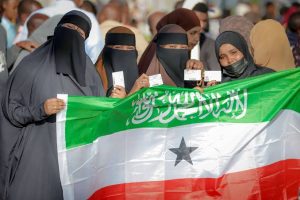Facebook Twitter (X) Instagram Somali Magazine - People's Magazine
Abdirahman Mahamed Abdullahi Irro’s resounding win in Somaliland presidential elections on November 13, securing 64% of the vote, marks a turning point in the region’s political landscape. However, the victory also brings to light pressing challenges, including corruption, unemployment, and ethnic tensions, that his administration must address to maintain stability in the self-declared republic.
Landslide Victory in Somaliland After Political Turmoil
Irro’s decisive win is seen as the culmination of a prolonged period of political tension, marked by delays and controversies surrounding the electoral process. The outgoing president, Muse Bihi Abdi, faced widespread criticism for allegedly manipulating constitutional procedures to extend his tenure. These actions led to violent protests and clashes that claimed dozens of lives, particularly among his Isaq and non-Isaq opposition.

Irro’s victory signifies a shift in Somaliland’s political dynamics and underscores the electorate’s demand for change and reform. His success is attributed to a robust campaign that resonated with young voters and marginalized communities, who have long demanded accountability and fair representation.
Somaliland Economic Challenges: Unemployment and Corruption
The new administration faces significant economic challenges, with unemployment being one of the most pressing issues. Somaliland, despite its relative stability in the Horn of Africa, has struggled to create jobs for its growing youth population.
Irro’s government will also need to tackle entrenched corruption, which has eroded public trust in institutions. Critics have long accused previous administrations of diverting resources and neglecting crucial infrastructure projects. Addressing these issues will be pivotal to building confidence in the new government and fostering economic growth.
Ethnic Divisions and the Legacy of Bihi Abdi
Ethnic tensions remain a delicate issue in Somaliland politics. The outgoing president, Muse Bihi Abdi, faced accusations of favoring certain clans, exacerbating divisions within the region. These actions fueled widespread dissatisfaction and protests, which highlighted the need for a more inclusive approach to governance.
Irro’s ability to bridge these divides will be critical to his administration’s success. Observers believe that fostering unity and ensuring equitable representation will strengthen Somaliland’s social fabric and political stability.
Strengthening Somaliland’s International Standing
Somaliland continues to seek international recognition as an independent state, a goal that remains elusive despite its functional government and relative stability compared to Somalia. Irro’s administration will need to leverage its domestic reforms to enhance its international standing.
By addressing corruption, unemployment, and governance issues, Somaliland could position itself as a model of stability in the Horn of Africa. Such progress may attract foreign investment and bolster its case for recognition on the global stage.
A Call for Dialogue and Transparency
Analysts emphasize the importance of dialogue and transparency in overcoming Somaliland’s challenges. The protests and violence during Bihi Abdi’s tenure serve as a stark reminder of the need for inclusive governance and open communication with citizens.
Irro’s administration has a unique opportunity to set a new precedent by prioritizing accountability and addressing the root causes of political unrest. Doing so will not only strengthen his government but also contribute to the long-term stability of Somaliland.

